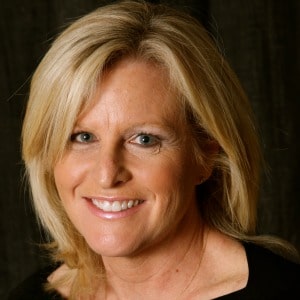
Even the big radio companies are discovering the challenge of monetizing podcasts. Beasley Media Group’s Chief Digital Content Officer Lori Burgess said her company has been “around the world and back” with podcasting and it’s time to make some money. Burgess was part of a panel, Wednesday morning at, the NAB Show in Las Vegas.
Beasley Media Group jumped into the podcasting space last year with the launch of bPod Studios, a new division dedicated to the space. It’s a mix of original content and recorded live shows from Beasley’s radio hosts that fans can listen to whenever they have the time. The company also asked its hosts to start producing podcasts, and rolled out “Best Of” shows, according to Burgess, who was promoted to her current position in January.
She also says the company has devoted a lot of time and energy to podcasting, and “now it’s time to make money.” But, she says, that’s proven to be a challenge. And she believes it’s because radio has not figured out how to market podcasts as of yet. Fred Jacobs, from Jacobs Media, has a theory about that. He believes radio is a little afraid to go all out promoting podcasting (and streaming) because those platforms are not rated the same way as over-the-air radio, so they don’t want to push those listeners away.
According to Burgess, after Beasley attempted to have their AEs sell podcasts, that idea was scrapped because the learning curve was time-consuming and, in some cases, selling podcasts was foreign to the AEs. Beasley now bundles its podcasts and sells them to national advertisers as a network.
Burgess says the Beasley plan moving forward is to figure out the content that works and market that, to develop podcasting into a platform that can be monetized. She acknowledged that original content is different to radio content. “It’s scripted. Original content needs to be refined and edited. The podcasting experience is different. It’s much more intimate.”






Podcasting is ad supported. It’s another platform to offer sponsors. Sponsors always want value, and that’s what podcasting provides. This isn’t a “one or the other” proposition. No need to put all of radio’s eggs in one basket. There were doubters about FM at one time too. Why divert attention from the AM signal? If you want to grow your business, you need to be looking at other platforms. Listeners don’t want to hear more commercials on the air signal.
As a generalization, radio has known for some time (decades) that its on-air content has been deteriorating on a continuous basis, and that its ability to produce influential advertising has made no noticeable improvements in the same time period.
Yet, when the gang gets together for its annual Slurps & Burps, there are no edicts issued afterwards along the lines of, “We have resolved to make extraordinary efforts in order that our locally-produced services and materials become so much more powerful that our prosperity will be assured,”
No. Radio, instead, chases podcasts like a terrier would when it jumps into traffic to harass and chew on the hubcaps of passing vehicles.
Plus, well before any “learning curve” is undertaken, there is an obligation to determine what materials, specifically, they will be committing.
Making money online? But surely you jest. KCAA has been forced to offer most of the online services for free that podcast companies charge for and mistakenly call “radio”.
Every time a pimple faced 16 year old has a brain storm for a new online service, we feel obligated to offer it, just to stay competitive. We started out as a simple AM and 20 years later, we’ve got audio and video going out in a dozen directions. This is a fight to retain relevance in a market place hell bent on destructive progress. Bill Clinton once said, “We need to find new ways to do things faster, cheaper and better”, which the Internet imposes on us daily, just like Amazon is doing to the local Malls. The long term future of AM-FM terrestrial radio can become a bridge to nowhere unless we adapt our models to compete in a world that no longer considers us essential.
Radio..always looking for the quick fix and focusing on something new when half as much time energy and attention spent on the over air product and better selling would yield immensely more results. Radio advertising works. It’s cheap. Easy to get done. It’s lasted 90 years.
Fred is right !!